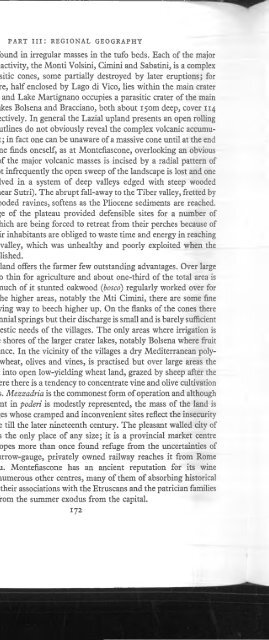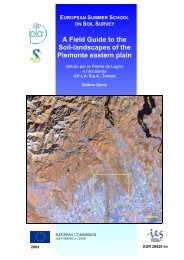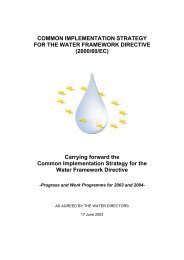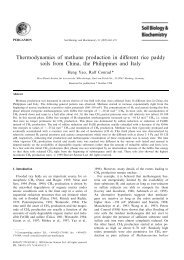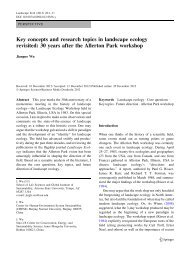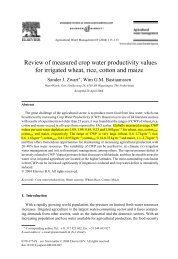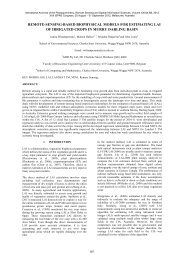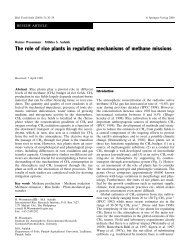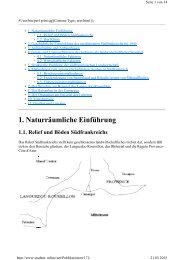Walker - 1967 - A geography of Italy
Walker - 1967 - A geography of Italy
Walker - 1967 - A geography of Italy
You also want an ePaper? Increase the reach of your titles
YUMPU automatically turns print PDFs into web optimized ePapers that Google loves.
THE SOUTH<br />
eastern Sicily, where rivers tap reservoirs o f permeable rock, are relatively well<br />
endowed with water supplies, but over vast upland areas where impermeable<br />
rocks predominate, water control for power, irrigation and domestic purposes is<br />
ruinously expensive when not practically impossible. Even so the resettlement o f<br />
the coastal plains and the intensification o f their agricultme hinges on the successful<br />
establishment o f water control. Although limestone areas may provide<br />
useful reservoirs for neighbouring districts their own surfaces are <strong>of</strong>ten almost<br />
entirely lacking in surface water. An obvious case is the Murge tableland whose<br />
large urban population relies on supplies brought by the ApuHan aqueduct from<br />
the headwaters o f the Sele river. The shortcomings o f the Southern environment<br />
as it affeas industrialization will receive attention below but it should be noted<br />
in passing that the availability o f reliable water supplies, which even in England<br />
is now taken less for granted, is a powerful locational factor tending to restrict the<br />
number o f zones which can hope to develop industry on a large scale.<br />
Any attempt to isolate and assess in detail the historical forces which have contributed<br />
to the relative economic backwardness o f the South would be out <strong>of</strong><br />
place here but it may be useful to suggest a few lines o f inquiry:<br />
1) The long periods o f insecurity to which the South has been subjected; it has<br />
been fought over by a succession o f destructive invaders - Goths, Vandals,<br />
Lombards, Byzantines, Arabs, Normans, French and Spaniards - and the<br />
coastlands in particular have been repeatedly the prey o f sea raiders from<br />
the days o f the Vandals to that o f the Barbary pirates.<br />
2) The relative unimportance o f the trading city as it developed in the North,<br />
to the great benefit o f agriculture; Naples is an obvious exception.<br />
3) The Spanish occupation which is condemned by many Italian historians not<br />
only for its oppression and maladministration but for the inculcation o f certain<br />
unhelpful social attitudes.<br />
4) The support o f the authorities, from the Middle Ages onwards, o f powerful<br />
pastoral elements, particularly in Apulia, whose interests <strong>of</strong>ten ran counter<br />
to a more effective occupation o f the land.<br />
5) The excessive concentration o f activity in the capital imder the Bourbons and<br />
the neglect <strong>of</strong> its estates by an absentee aristocracy; the survival o f feudalism<br />
imtil the French occupation and o f feudal attitudes long after it.<br />
6) The failure after i860 to match political unity with economic unity; the collapse<br />
<strong>of</strong> infant Southern industries in the face o f Northern competition.<br />
7) The complacency with which overseas emigration was for long regarded as<br />
the natural solution to Southern poverty.<br />
Whatever their origins it is generally admitted that over the centuries Southern<br />
society has accepted certain characteristic attitudes not all o f which are helpful<br />
in the present situation. (Some would assert that in this respect the South is<br />
merely <strong>Italy</strong> writ large.) For example, there is a pr<strong>of</strong>ound distrust o f the authorities<br />
and an imwillingness to co-operate actively with them, an attitude which a<br />
185


